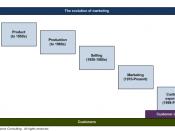This paper will discuss the importance of market orientation and how it supports any organization's overall goal of achieving a positive Net Marketing Contribution (NMC) to any of the (often costly) marketing activity that it undertakes. The definition of both of these concepts will be integral to the ensuing discussion.
Market orientation according to Narver and Slater as cited in the 2007 Garcia de Madariaga and Valor article, "is the culture that (1) places the highest priority on the profitable creation and maintenance of superior customer value, while considering the interest of other key stakeholders; (2) provides norms for behavior regarding the organizational development and responsive to market information" (2007:426). In simple terms unless organizations know where their particular market orientation actually is, and where it may be heading, the more tenuous the future of their market share. "Knowledge, including knowledge about market and technologies, is a resource, and as such, is heterogeneously distributed among firms within an industry" (Hunt 2000: cited in McDonald and Madhavaram, 2007:171).
Thus, the more knowledge that an organization can amass regarding their customers, competitors, and stakeholders, the more likely it is, to gain and retain a strong presence in the market in which it competes. Further to this point, "Market orientation is a firm's commitment to act upon the information that is amassed (market intelligence), such as (1) exogenous market factors (e.g. competition, regulation) that affect customer needs and preferences and (2) current as well as future needs of customers" Kohli and Jaworski (1990:3). In other words, just knowing what the particular market orientation is, without implementing strategies or acting in any other way necessary, upon the information gathered, is wasted energy and no real value to the success of the organization.
Blankson and Cheng cite Narver and Slater (1990) to identify the...


